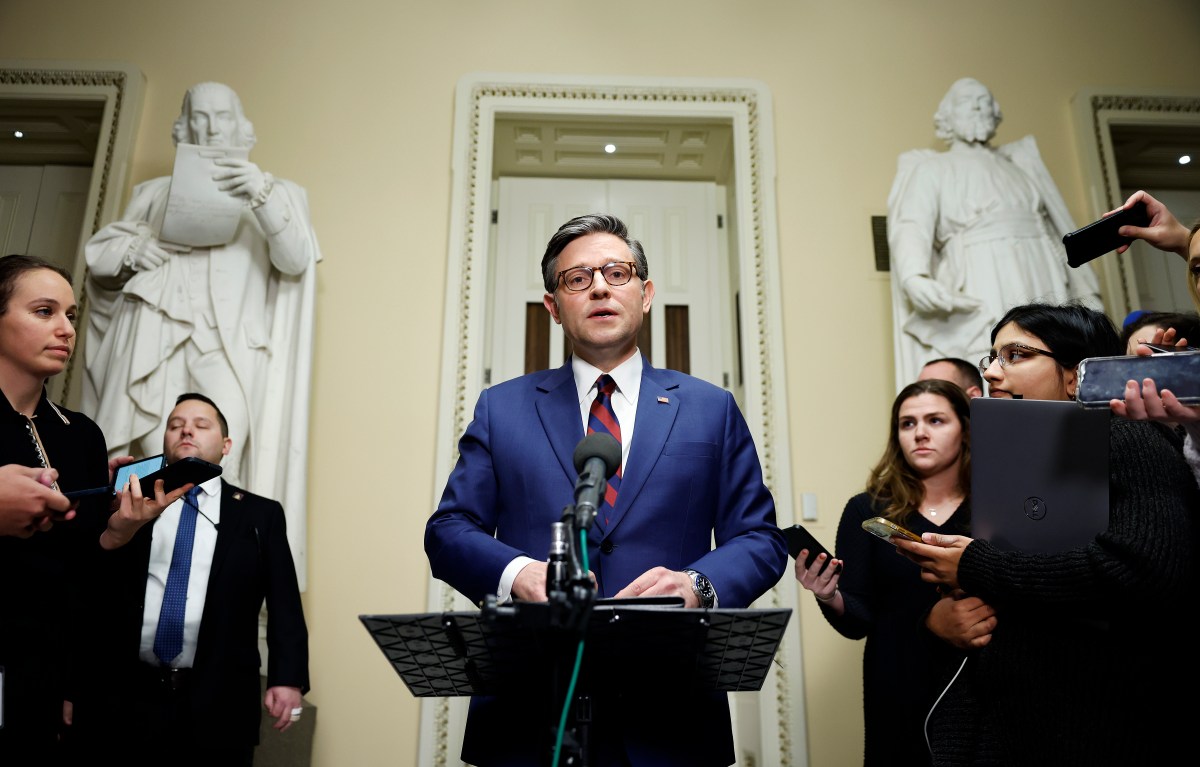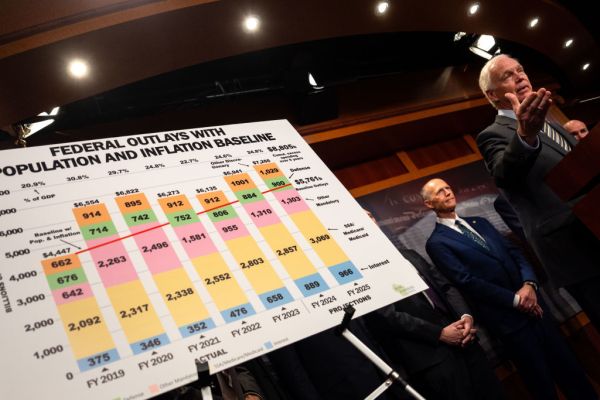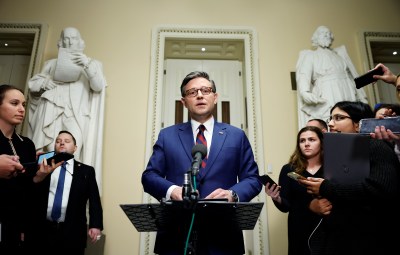Happy Monday! The Party City event supply chain is apparently going out of business and closing up shop fast, leaving plenty of time for Spirit Halloween stores to pop up in its place in strip malls across America before Halloween 2025!
Quick Hits: Today’s Top Stories
- Five people were killed and more than 200 others injured on Friday after a man drove a vehicle into a Christmas market in Magdeburg, a city in eastern Germany. Authorities detained the suspected attacker, identifying him as a 50-year-old Saudi Arabian national who has lived in Germany since 2006 and worked as a doctor. The suspect’s social media activity reflected anti-immigrant and anti-Islamic views as well as strong criticisms of the Kingdom of Saudi Arabia. “This perpetrator acted in an unbelievably cruel and brutal manner—like an Islamist terrorist, although he was obviously ideologically an Islamophobe,” German Interior Minister Nancy Faeser said Sunday. The attacker has a history of run-ins with German authorities based on criminal threats he’s made, but there was no record of him committing violent acts in the past.
- U.S. Central Command (CENTCOM) announced on Sunday that an American F/A-18 fighter jet had been shot down over the Red Sea in what was apparently a case of “friendly fire.” The aircraft’s two pilots safely ejected, with one sustaining minor injuries. The jet launched from the USS Harry S. Truman aircraft carrier and took fire from the USS Gettysburg, a guided missile cruiser in the Truman’s escort group. The incident occurred as U.S. forces carried out airstrikes against missile and command facilities used by the Houthis in Sanaa, Yemen. It’s unclear if airstrike operations were related to the jet’s downing or what the jet’s mission had been.
- CENTCOM said Friday that a strike in eastern Syria the day before killed an Islamic State leader, Abu Yusif, and another unidentified member of the terror group. “ISIS has the intent to break out of detention the over 8,000 ISIS operatives currently being held in facilities in Syria,” said Gen. Michael Erik Kurilla. “We will aggressively target these leaders and operatives, including those trying to conduct operations external to Syria.” The strike occurred in Deir ez-Zor Province, formerly controlled by the Syrian government of Bashar al-Assad, and Russia.
- President Joe Biden signed a spending deal into law on Saturday morning that will fund the federal government until March 14, avoiding a shutdown that would have begun after midnight on Friday. The bill passed the House of Representatives in a vote of 366-34—with Republicans casting all of the “no” votes—and the Senate in a vote of 85-11, with Sen. Bernie Sanders of Vermont joining 10 Republicans in opposing the measure. The deal included a $100 billion disaster aid package and a one-year extension of the farm bill, but most of the 1,547-page deal that House Speaker Mike Johnson originally negotiated last week, including health policy changes targeting pharmacy benefit managers, was scrapped.
- The Senate passed the Social Security Fairness Act on Saturday, a bill that would increase the amount of Social Security benefits that more than 2.5 million federal, state, and local public-sector employees can access by eliminating restrictions that the cohort had faced because they held public pensions. The House passed the bill in November, and if Biden signs the measure into law, which he is expected to do, it will apply to Social Security payments after December 2023 and is projected to cost $195 billion over the next decade, according to the Congressional Budget Office.
- State Department officials—led by Assistant Secretary of State for Near Eastern Affairs Barbara Leaf—visited Damascus, Syria, on Friday to meet with leaders of the militia groups governing the country in the wake of Bashar al-Assad’s ouster. The meetings represented the first U.S. diplomatic visit to the country since 2012. Leaf met with Hay’at Tahrir al-Sham leader Abu Mohammad al-Julani and she announced that, based on the conversation, the U.S. would no longer pursue the $10 million bounty the FBI has on al-Julani. “He came across as pragmatic,” Leaf said of her conversation with al-Julani. “It was a good first meeting. We will judge by deeds not just by words.”
- The Federal Reserve’s preferred measure of inflation, the personal consumption expenditures (PCE) price index, increased 2.4 percent year-over-year in November, the Bureau of Economic Analysis reported Friday, up one tick from a 2.3 percent annual rate one month earlier. After stripping out more volatile food and energy prices, core PCE increased at a 2.8 percent annual rate in November, still well above the Fed’s 2 percent target—although PCE and core PCE were both slightly better than economists’ expectations. Consumer spending, meanwhile, increased 0.4 percent last month after increasing 0.3 percent in October and 0.7 percent in September.
- Some 16 people in Tel Aviv were injured on Saturday after a rocket fired from Yemen evaded air defenses and struck the city early in the day. The strike followed attacks by the Israel Defense Forces on the Houthi rebel-controlled Yemeni cities of Sanaa and al-Hudaida on Thursday, targeting power plants and fuel tanks. That same day, the U.S. military also attacked a Houthi command center and missile-storage facility. The attacks came as part of an escalating series of exchanges between Israel and the Houthis, who have also targeted international shipping in the Red Sea over the past year in response to Israel’s war in Gaza.
- Guam’s Custom and Quarantine Agency said Saturday that seven Chinese nationals were arrested on the island between December 10 and 11, during which time a U.S. military base on Guam was conducting a missile interception test using a new radar system. At least four of the Chinese nationals were found “in the vicinity” of the base in question, according to the agency’s statement, and two were found “in distress” in a reef off of the coast of the island.
- Jackson County Circuit Court Judge Jerri Zhang issued a preliminary order on Friday that blocked several Missouri laws restricting abortion access in the state from going into effect, following the passage of a 2024 ballot measure that enshrined the right to an abortion in the state constitution. The laws, challenged in a lawsuit by Planned Parenthood and the American Civil Liberties Union, included a mandatory 72-hour waiting period before receiving an abortion, a mandate that doctors performing abortions have admitting privileges at nearby hospitals, and a requirement that a medication abortion be performed with the doctor who prescribed it present. The judge left in place other laws that in practice restrict abortions, including one regarding the licensing of abortion clinics and another requiring that abortions be performed by physicians, rather than physician assistants.
- Federal law enforcement officials said Friday that a freshman at George Mason University in Virginia had been arrested on charges of plotting a terror attack against the Israeli consulate in New York City. Abdullah Ezzeldin Taha Mohamed Hassan, an Egyptian citizen, was caught after telling an FBI informant online that New York was a “goldmine of targets,” and sending the informant the address of the Israeli consulate and links to instructions for constructing a homemade bomb. Hassan was arrested Tuesday in Falls Church, Virginia, on charges of distributing information relating to weapons of mass destruction.
A Manufactured Crisis

It wasn’t supposed to be close.
Back in September, lawmakers voted to extend government funding until December 20, nearly three full months after the fiscal year ended on September 30, having failed to pass all 12 appropriations bills through committee as needed.
Fast-forward to last week, and House Republicans seemed poised to kick the can down the road again, working with Senate Democrats and the Biden administration to extend government funding for a few months at roughly the same spending levels. The next time a deadline came up, the thinking went, the incoming GOP governing trifecta would be in place and could therefore include more of its priorities in an actual, non-continuing resolution (CR) budget.
By Friday afternoon, however, Americans getting a government shutdown for Christmas was a live possibility. What happened? Elon Musk, later joined by President-elect Donald Trump, blew up the original bipartisan deal brokered by House Speaker Mike Johnson, oversaw the demise of a second attempt, and ultimately forced Johnson to forge ahead with a successful Plan C.
In what has all the markers of a holiday miracle, Congress on Friday evening managed to pass a stopgap funding bill in time to forestall a government shutdown. But the frenzied back-and-forth bodes ill for Johnson’s continued speakership and the 119th Congress, which begins in early January, even as it also calls into question Trump’s ability to steer House Republicans by sheer force of will.
The House passed the ultimate version of its government funding agreement on a bipartisan basis, 366 to 34, around 6 p.m. on Friday, with Republicans casting all 34 of the votes against the bill. Just before 11 p.m., one hour from the funding deadline, Senate Majority Leader Chuck Schumer said Senate Democrats and Republicans had come to an agreement that would allow the Senate, too, to pass the CR, which it ultimately did a little after midnight by a vote of 85 to 11.
With President Joe Biden’s signature on Saturday morning, government funding was extended until March 14 and a shutdown—that would potentially have delayed U.S. service members’ paychecks in the middle of the holiday season—was avoided. The Biden administration, seeing the bill’s passage was imminent late Friday, did not implement shutdown protocols even though funding briefly lapsed at midnight on Friday night.
So why did this come down to the wire? When we wrote to you on Wednesday morning, the original continuing resolution to fund the government had just been introduced late Tuesday night. Clicking in at a hefty 1,500 pages, it included a number of the types of concessions to Democrats a Republican speaker of the House has to make when his majority is small and fractious. Johnson was likely going to have to rely on Democrats to pass the bill, since some Republican spending hawks and general bomb-throwers, particularly in the House Freedom Caucus, couldn’t be counted on to help pass such funding bills. The CR agreement included hurricane relief funding, farm aid, and other add-ons well beyond simply extending government funding at current levels.
Then, on Wednesday, before most members of Congress had time to read the bill—if they ever intended to—Elon Musk weighed in. And weighed in again, and again, and again, more than 100 times on his social media app X.
The co-chair of the newly created Department of Government Efficiency wasn’t a fan. In the second of his dozens of tweets against the bill—plenty of which included information about it that was simply untrue—he shared a picture of the bill, printed and stacked. “Ever seen a bigger piece of pork?” he asked.
Johnson tried to defend the spending as necessary compromises—live on Fox & Friends after Musk tweeted his opposition to the bill. “I was communicating with Elon last night. Elon and Vivek [Ramaswamy] and I are on a text chain together,” he said. “Remember, guys, we still have just a razor-thin margin of Republicans, so any bill has to have Democrat votes. They understand the situation. They said, ‘This is not directed at you, Mr. Speaker, but we don’t like the spending.’ And I said, ‘Guess what, fellas: I don’t either.’”
Johnson, fighting a losing battle, also tried spinning the bill as a table-setting measure for the new administration. “By doing this we’re clearing the decks and we’re setting up for Trump to come in, roaring back with the America First agenda,” he said. “That’s what we’re going to run with gusto beginning January 3.”
Trump apparently didn’t buy it. He came out in opposition to the bill on Wednesday, and, as a fun twist, demanded that any spending bill include a measure that would suspend the debt ceiling. “Increasing the debt ceiling is not great but we’d rather do it on Biden’s watch,” he wrote in a joint statement with Vice President-elect J.D. Vance on Wednesday. On Thursday, he’d amended that to say he wanted to dump the debt ceiling altogether. The one-two punch of Musk and then Trump was reportedly a case of the right hand not knowing what the left hand was doing—and senior Trump confidantes are reportedly peeved that Musk made the CR a thing.
But never let a crisis go to waste. It may seem a little strange, a Republican president demanding Congress remove the cap on deficit spending. But as Politico has reported, Trump foresaw that he’s headed for an ugly fight over the aforementioned ceiling in 2025, when the current debt limit deal negotiated in 2023 expires and the U.S.—currently the proud owner of the global reserve currency—once again faces the possibility of defaulting on its debts. Plenty of Republican hardliners will be deeply resistant to suspending the debt ceiling again, setting up an intraparty squabble that could stall his agenda. “Once [the spending bill] was going down anyway, there was no longer any point in restraining himself about the debt ceiling,” our own Nick Catoggio explained.
With congressional Republicans fielding calls to their offices from activated Elon followers, Johnson pulled his Plan A measure without even putting it to a vote. He moved on to Plan B, a pared-back bill that extended government funding and included some, but not all, of the add-ons that had broad support: farm aid and an extension of the farm bill for a year, plus disaster relief aid. And, naturally, a debt ceiling suspension until 2027.
But that plan was doomed—and not just because Democrats, having been burned, were not interested in helping Johnson out. Plan B, with its debt ceiling suspension, ran into the buzz saw of Johnson’s own conference. “More debt. More government,” Rep. Chip Roy of Texas, a member of the House Freedom Caucus, tweeted on Thursday. “Increasing the Credit Card $4 trillion with ZERO spending restraint and cuts. HARD NO.”
On Thursday evening, when the bill was put to a vote of the full House, 38 Republicans broke ranks with Trump to sink it, a surprising show of force from a conference that tends to move in lock-step with the party’s leader. Trump called out Roy specifically on Truth Social, suggesting he should face a primary challenge.
Enter Plan C, which was just like Plan B, but without raising the debt ceiling. The slimmer bill, which still included some of the aforementioned Democratic priorities, was sufficiently palatable to all sides that it managed to pass the House on Friday evening, though not without 34 Republican defections. “I agree with Donald Trump that the debt limit has historically just been a gimmick used by career politicians that never leads to real reforms that benefit hardworking Americans,” GOP Rep. Rich McCormick of Georgia, who voted against the versions of the bill with and without the debt ceiling measure, tweeted on Friday. “I also understand Donald Trump’s frustration that a debt ceiling fight will interfere with his agenda in 2025. That’s why Congress must get real about downsizing government right here, right now. Not in 2 years, not in 3 months. Right now.”
Though Trump has been fairly mum about the ultimate bill since its passage, Johnson claimed the president-elect was content with the outcome. To Musk, he was less deferential. “I said, ‘Hey, do you want to be speaker of the House? I don’t know.’”
But there’s certainly a question as to whether Johnson will survive as speaker when the new Republican majority gathers to elect one in the early days of next year. As our own Charles Hilu reported on Friday, some lawmakers are starting to make ominous noises about not supporting the speaker again. He presumably still has Trump’s endorsement, after he formally backed Johnson shortly after the election—but as Trump’s debt ceiling gambit revealed, that may not be a guarantee of success. McCormick is already a no, as are several others, apparently. “If the vote were held today, he probably does” have the votes to become speaker, Rep. Andy Harris of Maryland, chair of the House Freedom Caucus, told reporters Wednesday, “but the vote’s not held today. It’s held on January 3.”
As for Trump, Musk’s first spin with his newfound power in the president-elect’s orbit left Democrats suggesting that Trump was playing second fiddle to “President Elon Musk.” And it clearly rankled.
“Elon has done an amazing job. Isn’t it nice to have smart people that we could rely on?” Trump said at the Turning Point USA conference on Sunday. “So we want to thank him, but no, he’s not going to be president, that I can tell you. And I’m safe. You know why he can’t be? He wasn’t born in this country.”
Worth Your Time
- Derek Thompson, one of TMD’s favorite explainer journos, tackled a perplexing question in his latest piece for The Atlantic: Why did U.S. public health improve in 2024? “By my count, this year marks the first time in the 21st century that obesity, overdose deaths, traffic fatalities, and murders all declined in the official data analysis,” he wrote. “The level of premature death in the U.S. is still unacceptably high. But progress isn’t just about where you are; it’s also about what direction you’re going in. And by the latter definition, 2024 was arguably the best year for American health reports in decades. It would be convenient—for both efficient punditry and public-policy clarity—if a small number of factors explained all of these trends. After all, if we could isolate a handful of lessons, we could carry them forward and unleash a golden age of American health. Unfortunately, reality is messy and does not always comport with our preference for simple explanations.”
- Writing for the Long War Journal, Will Selber argued that the Iranian military and the Islamic State still pose serious threats to the United States, not only abroad but at home. “Both the Islamic State and the [Iranian Revolutionary Guard Corps] have repeatedly tried to target and kill Americans in recent years, and these groups remain a persistent threat,” Selber wrote, citing a string of arrests and charges by federal law enforcement involving individuals who support ISIS or the Iranian regime. “While [ISIS] has not conducted a successful attack in the United States since 2017, when Akayed Ullah, a Bangladeshi, partially detonated a pipe bomb in the New York City Subway that injured four people, it has come perilously close on numerous occasions this year. Despite the Islamic State’s international staying power, the Biden administration seems determined to ‘wind down’ the US military’s presence in Iraq and its mission against the Islamic State. … Should the incoming administration of President Donald Trump follow Biden’s lead, the Iraqi Security Forces will likely not have the capacity to contain a resurgent Islamic State.”
Presented Without Comment
Reuters: Trump Threatens To Retake Control of Panama Canal
Also Presented Without Comment
The Hill: [NYC Mayor Eric] Adams Says He Wanted To Look [Luigi] Mangione in the Eye During Perp Walk
In the Zeitgeist
Rickey Henderson, the outfielder who suited up for nine teams during his 25 seasons in Major League Baseball and held the all-time MLB record for stolen bases, died over the weekend at the age of 65. Please enjoy 30 minutes of Henderson just doing his thing:
Toeing the Company Line
- In the newsletters: Jonah Goldberg argued that when government is exciting, it isn’t doing its job, Nick Catoggio questioned (🔒) how serious Elon Musk and House Republicans actually are about fiscal restraint, Chris Stirewalt announced (🔒) the year’s photo caption contest winner, and theologian Ephraim Radner wrote in Dispatch Faith about how both Christmas and Hanukkah are challenged by creeping commercialization.
- On the podcasts: Jonah ruminated on the government shutdown battle and his favorite historians while and Michael Reneau interviewed Ephraim Radner for The Skiff (🔒). On today’s episode of The Dispatch Podcast, Jamie Weinstein interviews retired Gen. David Petraeus about the latest developments in the Middle East and what’s up with those drones in New Jersey.
- On the site over the weekend: Giancarlo Sopo explored the dark and light sides of the American psyche in two Christmas films, Luis Parrales unpacked what recent ad campaigns might indicate about the culture’s rightward shift, and John and Lauren McCormack told the story of how their daughter was named.
- On the site today: Reuel Marc Gerecht argues that Khamenei’s anti-American strategy was working until Hamas invaded Israel on October 7, and Charles Hilu profiles John Curtis, the new senator from Utah replacing Sen. Mitt Romney.
Let Us Know
How do you see the Trump-Musk relationship playing out over the course of Trump’s presidency?








Please note that we at The Dispatch hold ourselves, our work, and our commenters to a higher standard than other places on the internet. We welcome comments that foster genuine debate or discussion—including comments critical of us or our work—but responses that include ad hominem attacks on fellow Dispatch members or are intended to stoke fear and anger may be moderated.
With your membership, you only have the ability to comment on The Morning Dispatch articles. Consider upgrading to join the conversation everywhere.